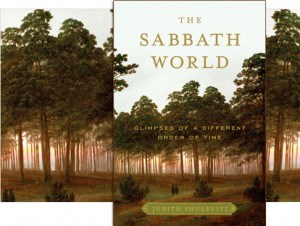
When I went to the spiritual spa last week, I brought a few books with me. I've been slowly making my way through John Stott's The Cross of Christ, and I brought Tim Keller's latest, King's Cross. But I didn't open either one. Instead, I started reading Judith Shulevitz's The Sabbath World: Glimpses of a Different Order of Time. I've only made it through three chapters so far, so I may well write more in weeks to come, but I'll offer a few thoughts so far.
This book took me to a thin place, a place where ideas seep into my consciousness in such a way as to transform my thinking and doing. Shulevitz is a somewhat-practicing Jew who found herself fascinated by and yet ambivalent about the Sabbath, just as, she claims, most Americans find themselves both longing for and eager to avoid the Sabbath:
When we pine for escape from the rat race; when we check into spas, yoga centers, encounter weekends, spiritual retreats... when we deplore the increase in time devoted to consumption... whenever we worry about these things, we are remembering the Sabbath, its power to protect us from the clamor of our own desires. But when, say, we return from a trip to some less developed country and feel a sense of relief that our twenty-four-hour economy allows us to work, shop, dine, and be entertained when we want to, not according to some imposed schedule, at that point, too, we are remembering the Sabbath. We are remembering how claustrophobic its rigid temporal boundaries used to make us feel.
The result of this dual fascination and ambivalence for Shulevitz is this book–part history, part memoir, part meditation. And God used it to challenge and encourage me as I set aside two days to (re)consider my own priorities and rhythms and how I spend my time. (Note the words "spend my"–"spend," as if time is a commodity... "my," as if it belongs to me as an individual...)
On numerous occasions, Shulevitz returns to the idea that our attitude and approach toward time carries moral weight. She writes, "The Sabbath–God's claim against our time–implies that time has an ethical dimension. We rest in order to honor God and his creation, which suggests that not to rest dishonors both."
Reading this book feels like drinking from a pool of cool water on a scorching day. It helped me remember that the Sabbath is as much gift as it is command and that each day can contain an element of Sabbath within it–an element of honoring God and creation with work and with rest, and an element of enjoying God and creation with playful attentiveness to beauty and delight.
What challenges do you face in resting from your work?
What do you do in order to rest and in order to enjoy your life?
Support our work. Subscribe to CT and get one year free.














